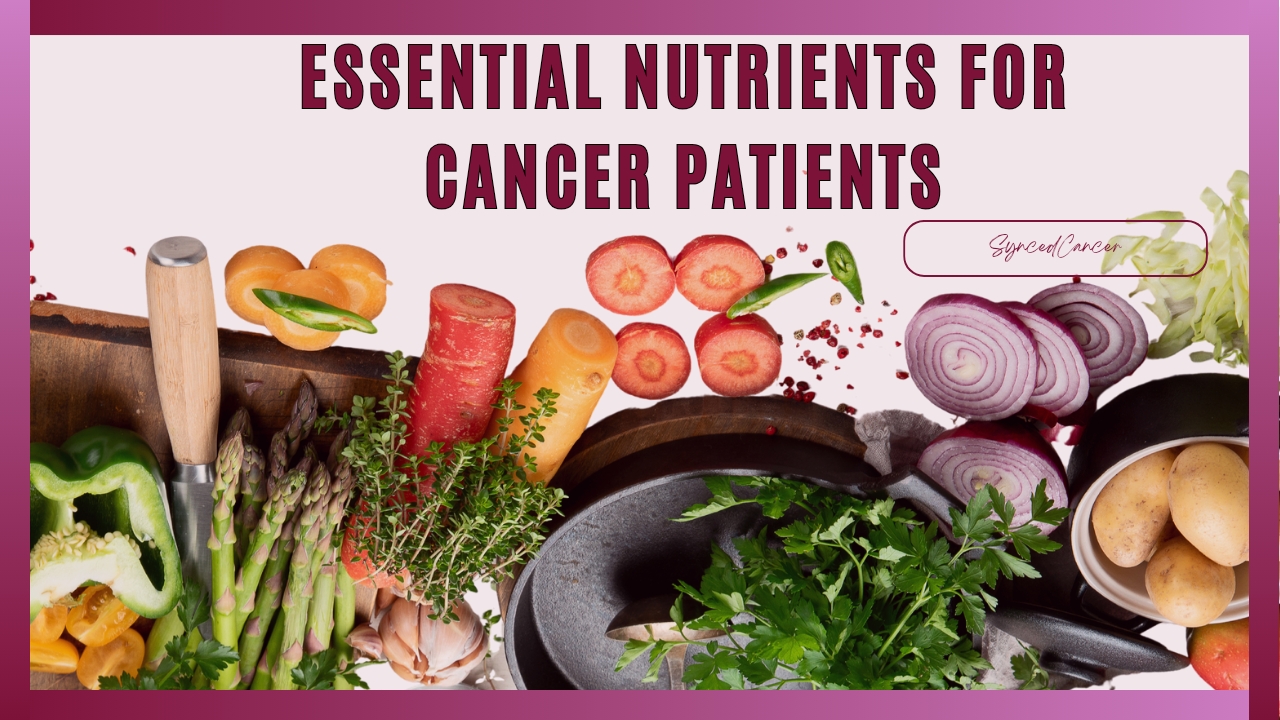Cancer patients face unique nutritional challenges due to the disease itself and the side effects of treatments such as chemotherapy, radiation, and surgery. It is impossible to overstate the transformational potential of a healthy diet for cancer patients. Taking care of your body during treatment is more important than ever. We will look at doable dietary tactics in this article to help you maintain your health and wellbeing while treating cancer.

- Macronutrients: Energy and Repair Resources
Carbohydrates: Choose complex carbs, such as those found in whole grains, fruits, and vegetables, to give you long-lasting energy and the vital fiber your digestive system needs.
Lean protein sources including chicken, turkey, fish, tofu, and legumes should be included in your meals. Protein promotes immunological response and helps repair tissue.
Plant-based foods like fruits, vegetables, whole grains, and nuts must also be emphasized. These nutrient-dense options offer vital vitamins, minerals, and antioxidants to help fight oxidative stress and inflammation.
Fats: Choose sources of healthy fats like avocados, olive oil, nuts, and seeds. These fats provide sustained energy. and support cell membrane function. You must ensure to limit saturated and trans fats found in processed foods, opting instead for the heart-healthy monounsaturated and polyunsaturated fats (Omega 3 and 6 Fatty Acids).
- Micronutrients:
Micronutrients are a form of nutrients required by your body in small quantities but are powerful in their various metabolic functions in your body. They enhance how your body uses the macronutrients earlier reported.
Micronutrients are food sources
Vitamin C: Include citrus fruits, strawberries, bell peppers, and broccoli
Vitamin D: Seek out fortified dairy products, fatty fish, and sunlight exposure
Zinc: Incorporate zinc-rich foods like lean meats, shellfish, legumes, nuts, and seeds
Let’s examine some of their specific functions in your body:
Antioxidants for Cellular Protection
Vitamin A, C, E, Selenium are micronutrients that act as antioxidants, mopping up free radicals that can damage healthy cells. This is important because cancer development has been linked to oxidative stress. While some studies suggest antioxidants might interfere with certain cancer treatments, it is crucial to discuss this with your doctor to determine the best approach for you.
Observe the following micronutrients and their sources.
- Vitamin E: Choose foods rich in vitamin E such as almonds, sunflower seeds, spinach, and avocado to protect cells from oxidative damage.
- Selenium: Include selenium-rich foods like Brazil nuts, seafood, whole grains, and eggs to support antioxidant defense mechanisms.
- Beta-carotene: Enjoy orange and yellow fruits and vegetables like carrots, sweet potatoes, and apricots to promote cellular repair and immune function.
Immune System Support
- Vitamin B6, C, D, and Zinc:These micronutrients are essential for a healthy immune system, which is crucial for fighting off infections and potentially even cancer cells. Maintaining a strong immune system can help you tolerate treatment better and recover faster.
Energy Production and Repair
- B vitamins (B1, B2, B3, B6, B12):These B vitamins play a key role in converting food into energy, which your body needs to cope with treatment and daily activities. They also contribute to cell repair and healthy red blood cell production.
Other Important Micronutrients
- Vitamin D:This vitamin helps regulate calcium absorption, which is vital for bone health. Cancer treatments can weaken bones, so maintaining adequate Vitamin D levels is important.
- Iron:Needed for transporting oxygen throughout your body. Iron deficiency can lead to fatigue, a common side effect of treatment.
Summarily, by focusing on macronutrients, micronutrients, and antioxidants through nutrient-rich food sources, you can support your body’s resilience and healing during cancer treatment.
- Stay Hydrated with Fruits
Cancer patients need to stay hydrated, even though the word “hydration” usually conjures images of drinking water. But staying hydrated goes beyond simply drinking water. Try to include foods that are high in water content, such as oranges, cucumbers, and watermelon, in your diet; however, stay away from sugar-filled drinks and too much caffeine, as these can cause dehydration and energy swings.
- Mindful Eating for Digestive Comfort:
You must learn to practice mindful eating techniques to alleviate digestive discomfort commonly experienced during cancer treatment. Chew your food slowly, savoring each bite, and avoid large meals that may cause bloating or nausea. Experiment with smaller, more frequent meals and snacks to maintain energy levels and prevent feelings of hunger or fullness.
- Embrace Nature Therapy:
Spend time outdoors in nature, whether it is a leisurely walk in the park, gardening, or simply soaking up the sun’s rays. Nature therapy has been shown to reduce stress, improve mood, and boost immune function. Engage your senses by noticing the sights, sounds, and smells of the natural world, allowing yourself to be fully present in the moment.
- Monitor and Adjust for Treatment Side Effects
Different cancer treatments can lead to specific nutritional issues, such as difficulty swallowing, mouth sores, or changes in taste. Tailoring the diet to address these issues can improve intake and comfort.
Strategies for Specific Side Effects
- Difficulty Swallowing: Choose soft, moist foods like smoothies, soups, and mashed potatoes. Avoid dry, tough, or sticky foods.
- Mouth Sores: Eat soft, non-acidic foods like scrambled eggs, cottage cheese, and cooked cereals. Avoid spicy, salty, or acidic foods.
- Changes in Taste: Experiment with different flavors and seasonings to find what is most palatable. Tart flavors like lemon or lime can sometimes enhance taste.
- Consult with a Nutrition Professional
A registered dietitian specializing in oncology can provide personalized nutrition advice tailored to the patient’s specific needs, treatment plan, and side effects. Regular consultations can help adjust the diet as needed to ensure optimal nutrient intake and address any new challenges that arise.
Benefits of Professional Guidance:
Personalized meal planning based on treatment and side effects
Strategies to manage symptoms and maintain a balanced diet
Support for achieving and maintaining a healthy weight
Guidance on safe use of supplements, if necessary
Conclusion
It should go without saying that at this period, concentrating on vital nutrients can best support your overall health and wellbeing. You also need to be aware of the critical roles played by antioxidants, micronutrients, and macronutrients as well as the dietary sources that are most suited for cancer patients. Including these nutrition-focused techniques into your everyday routine will assist in bolstering your body’s resistance to cancer therapy. Recall that providing your body with healthful foods is an effective kind of self-care that may enhance your general wellbeing.



What do you think?
It is nice to know your opinion. Leave a comment.